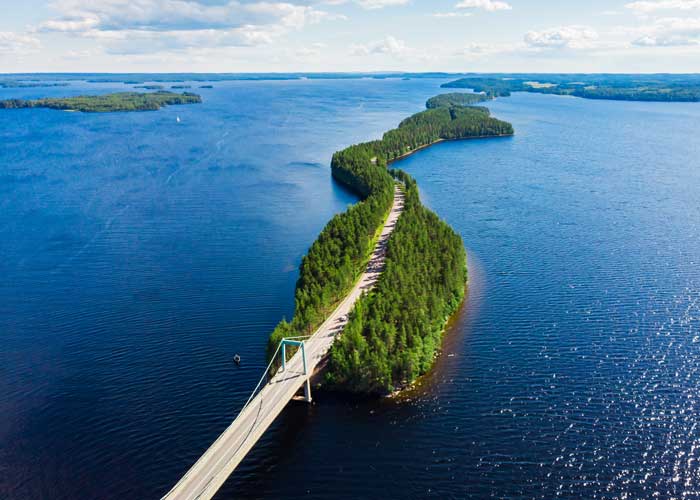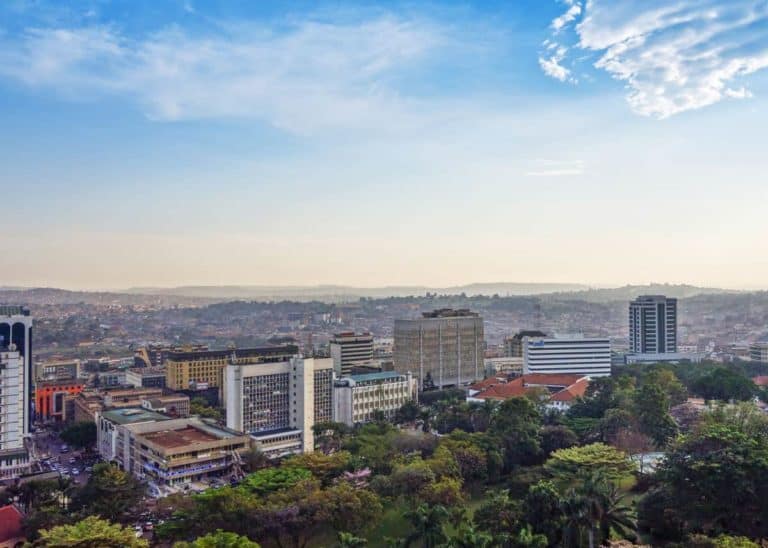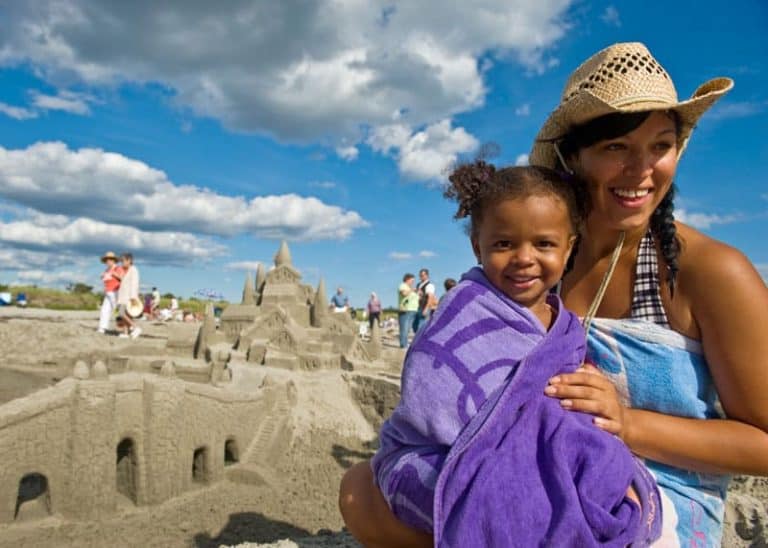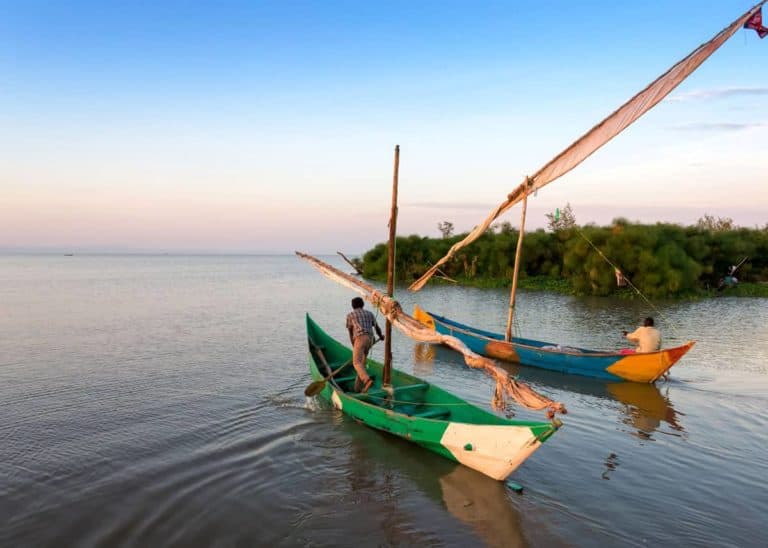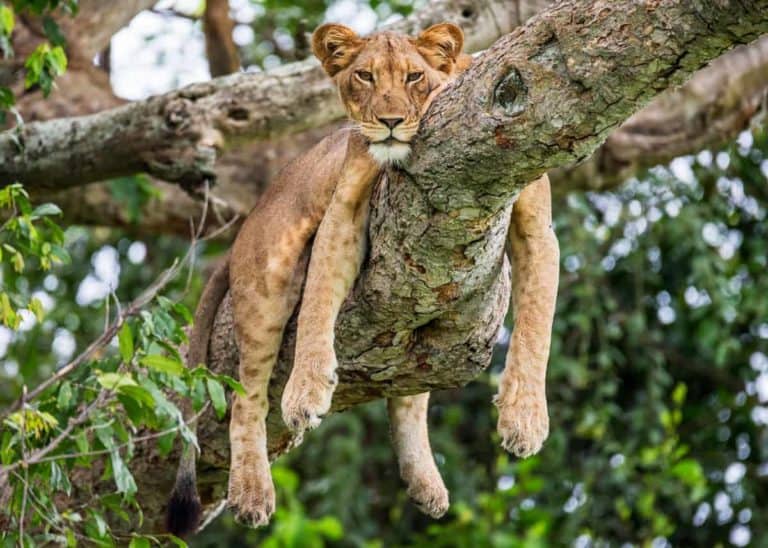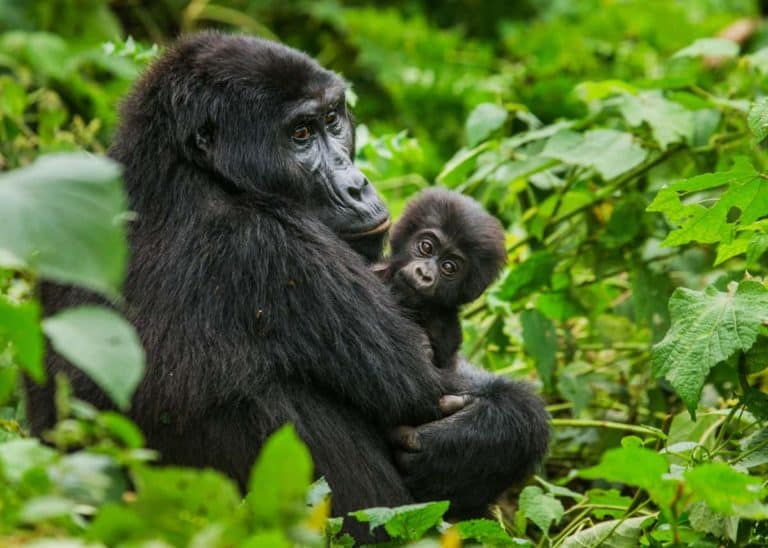12 Highest Mountains in Africa: Travelers Guide
Here’s your full guide to the tallest mountains in Africa. This ordered list includes tons of detail, including wildlife, climate, and climbing difficulty of each mountain.
Though there are many mountains in Africa, like Mt. Kenya and Mt. Stanley, the tallest mountain on the continent is Mt. Kilimanjaro. At nearly 20,000 feet in elevation (or 5,895 meters), Kilimanjaro stands tallest with many ranges coming in close to its elevation.
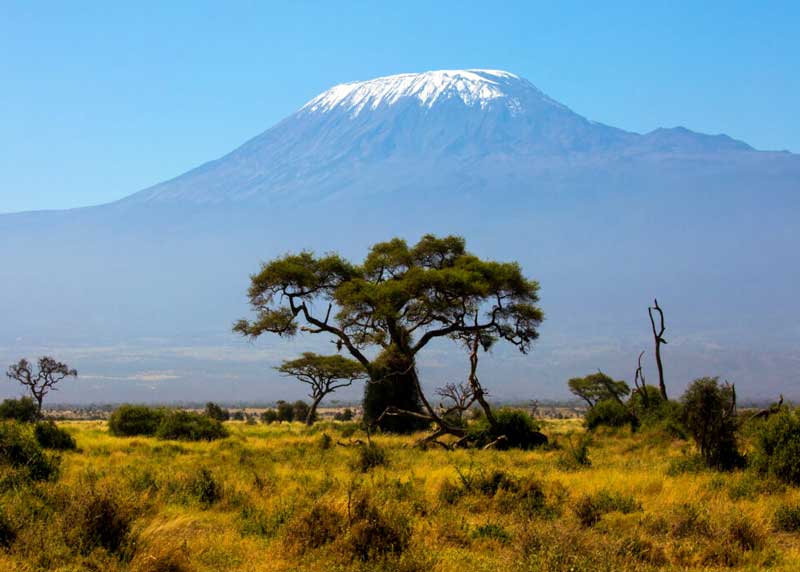
If you’ve ever wondered which ranges take the cake for tallest summits, look no further! Read below for a list of the 12 highest mountains in Africa!
1. Mt. Kilimanjaro, Tanzania
With an elevation of 19,341 feet, Mt Kilimanjaro takes the spot for #1 on the list of highest mountains in Africa.
Living on the Kilimanjaro range, this mountain takes up a ton of room (about 500 square miles) of Tanzania, has three volcanic cones and five different climatic zones.
3 Volcanic Cones / Peaks
- Kibo: Home to Uhuru peak, the highest of the three peaks.
- Mawenzi
- Shira
All the peaks are volcanic, though all are extinct except for one. Kibo, the highest peak of the three, is a dormant volcano, and it hasn’t had any suspicious activity for about 200 years.
Uhuru Peak is the highest point on Mt. Kilimanjaro. And is Africa’s highest point.
Mt. Kilimanjaro is the world’s highest freestanding mountain.
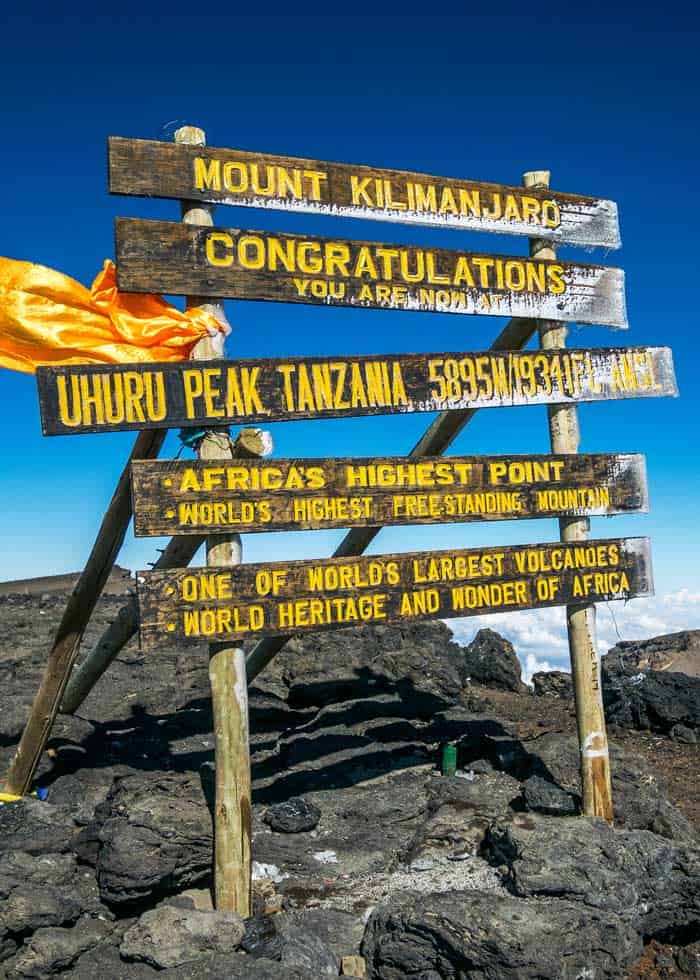
Climate on Mt. Kilimanjaro
As mentioned above, Kilimanjaro has five different climate experiences for climbers and visitors.
Those climates include:
- Rain forest
- Heathland
- Moorland
- Alpine desert
- Arctic
Kilimanjaro, like Tanzania where the mountain resides, is prone to rain. Having two rainy seasons a year, and the possibility of snow at any time, the climate is usually on the colder side. Ranging from about 19 degrees Fahrenheit (-7 degrees Celsius) on the summits.
Animals + Vegetation on Mt. Kilimanjaro
There is much wildlife and flora to dawn the Kilimanjaro range.
Here are just a few that can be seen:
- Elephants
- Bushbucks
- Dik-diks (a very small antelope)
- Warthogs
- Leopards
- Hyenas
- Sunflowers
- Beans
- Maize
Most of the larger animals stick to the plains surrounding the mountain, but on occasion, there have been sightings throughout the range of the various mammals listed above.
Most commonly though, people spot the Kilimanjaro Shrew and the Kinyongia Tavetana Chameleon. (Both known specifically to stay and raise their growing families in the Kilimanjaro realms of Africa).
Mt. Kilimanjaro Difficulty Level
Do-able.
Because the mountain is popular and well-known, tourists over the years have carved a decent path through the range. Thankfully, this makes climbing Kilimanjaro a bit easier and a bit safer.
According to this site, “it is not a climb, it’s a hike. You can walk all the way to the top.”
That being said, not a lot of people make it to the mountain’s actual summit (mostly due to altitude sickness), but the hike without the summit is easy enough for any willing person, without any specialized gear.
Planning a trip? Check out our guide: 16 Safest Countries in Africa
2. Mt. Kenya, Kenya
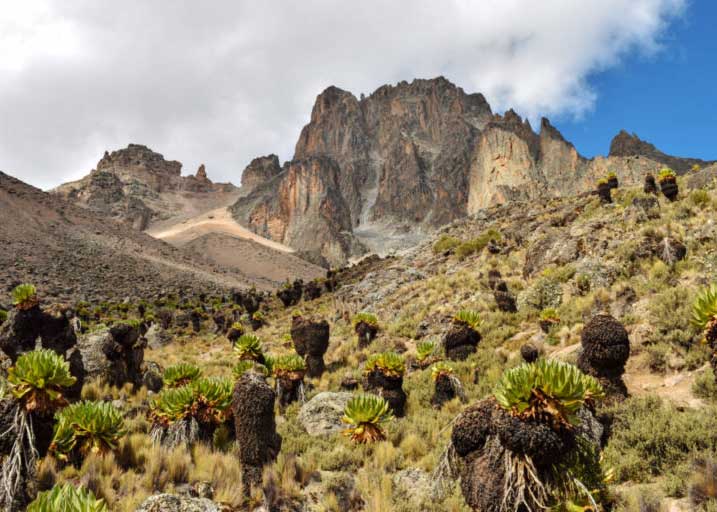
Coming out at #2, Mt. Kenya is 17,047 feet in elevation and sits on the Kenya Mountain Range.
Peaks on Mt. Kenya
- Batain
- Nelion
- Lenana
The three peaks are snow-capped, extinct volcanoes
Mt. Kenya Climate
Kenya has two seasons: a wet season and a dry season.
For half the year, the mountain range is rainy and monsoon-ish while the rest of the year is deserty and dry.
As far as daily temperatures go, it never gets below 54˚F (12˚C), making the days hot and the nights cool.
Animals + Vegetation on Mt. Kenya
Difficulty Level: Climbing Mt. Kenya
Medium.
Because of ice and snow, the climb requires a bit more expertise and climbing gear but isn’t known to be too strenuous for the experienced climber.
3. Mt. Stanley, Uganda
Standing tall at 16,794 feet in elevation, and having twin peaks, Mt. Stanley is the third tallest mountain in Africa. It is the highest peak in the Rwenzori Mountains.
Peaks on Mt. Stanley
- Magherita
- Alexandra
Mt. Stanley Climate
Known to be constantly shrouded in mist, Mt. Stanley drips with precipitation and mystery.
Animals + Vegetation on Mt. Stanley
Though animals aren’t a huge sight here, there is plenty of green vegetation and wildlife surrounding Uganda.
- Beans
- Sweet potatoes
- Bananas
- Copper mines
- Cobalt deposits
Difficulty Level: Climbing Mt. Stanley
Medium-hard.
Because of the aforementioned mist mixed in with a little ice, this mountain range is a bit harder to climb than some of the other mountain ranges mentioned thus far.
Known to be home to many fissures and chasms, this climb will give even more experienced mountaineers a run for their money.
4. Mt. Speke, Uganda
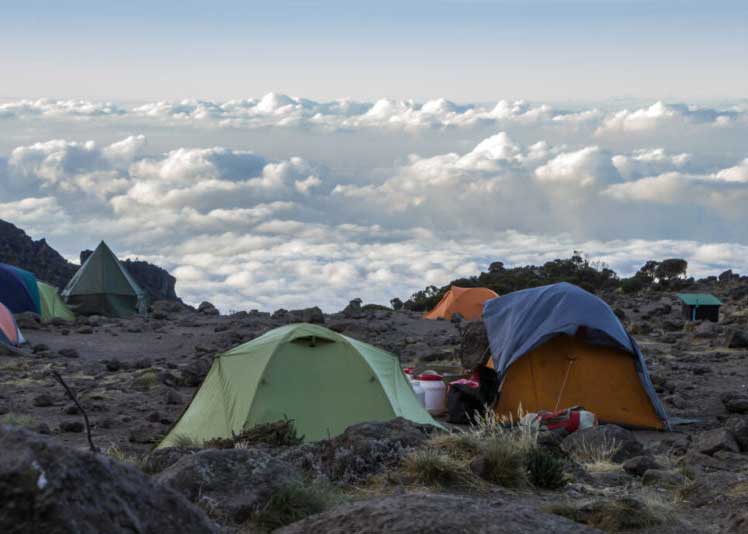
Fourth on the list is Mt. Speke. Elevation at 16,043 feet, and in the Rwenzori Range with neighbors Mt. Stanley and Mt. Baker, this mountain is beautiful.
Climate on Mt. Speke
Being in the same region as Mt. Stanley, Mt. Speke is also known to be misty and clouded.
Animals + Vegetation: *See Mt. Stanley
Difficulty Level: Climbing Mt. Speke
Medium-hard.
Much like its cousin, Mt Stanley, Mt. Speke is a harder trek due to its ice.
Because this range also has sharp edges, this could be a more difficult climb for less-experienced climbers. Especially when you add slippery summits in the mix.
More reading: 22 Interesting Facts About Uganda
5. Mt. Baker, Uganda
Stationed at 15,892 feet, Mt Baker takes its place as the third and final mountain in the Rwenzori Range.
With the other two (Mt. Stanley and Mt. Speke) so close, the three together make up a triangle formation of mountain ranges named by Ptolemy as “the Mountains of the Moon.”
Climate: *See Mt. Stanley
Animals + Vegetation: *See Mt. Stanley
Difficulty Level: Medium-hard. *See Mt. Stanley
6. Mt. Meru, Tanzania
Coming out of Uganda and making our way back to Tanzania, we see Mt. Meru standing tall at 14,968 feet.
With a summit collapse a long time ago, Mt. Meru can get a little jagged after the part of green forest, but there’s a crater worth seeing at the top of this dormant mountain.
Climate on Mt. Meru
Like Kilimanjaro, the climate can be all over the place depending on where you are on the range.
For the most part, it’s forested and green and not too cold on the ground level.
Mt. Meru Animals + Vegetation
Covered with trees and sun, the following animals love the atmosphere:
- Monkeys
- Birds (over 380 different speices)
- Leopards
Difficulty: Climbing Mt. Meru
Do-able.
Like Kilimanjaro, Mt. Meru is mostly well marked.
Though less popular than our #1 tallest, Mt. Meru offers a beautiful hike without any special equipment made necessary.
7. Ras Dashen, Ethiopia
Part of the Simien Range in Ethiopia, this mountain stands at 14,872 feet.
Animals + Vegetation on Ras Dashen
Home to a few native species:
- Ethiopian wolves
- Caracal
- Gelada
Difficulty: Climbing Ras Dashen
Do-able.
Most say the climb is as beautiful as it is easy.
Taking less than a day to climb and enjoy, Ras Dashen offers great views and little sweat.
8. Mt. Karisimbi, Rwanda
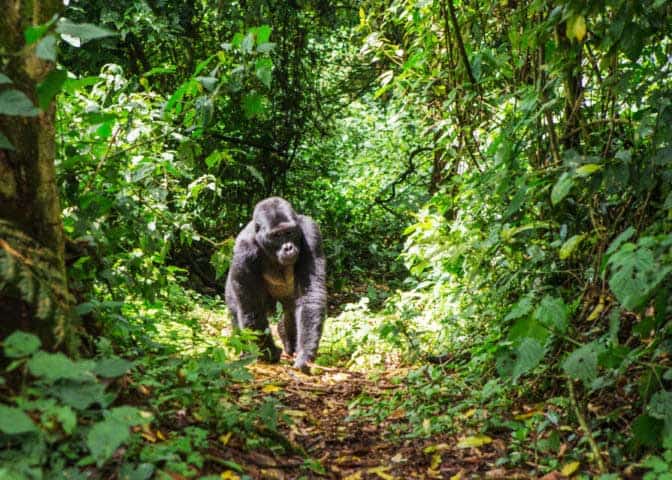
Coming up at 14,786 feet, Mt. Karisimbi stands #8 on our list!
Animals + Vegetation on Mt. Karisimbi
Difficulty: Climbing Mt. Karisimbi
Do-able.
Taking about 2-3 days to hike up, Mt. Karisimbi isn’t that hard a trek, and everyone says it’s worth the trip just to see the gorillas up close and personal.
9. Mt. Elgon, Kenya / Uganda
With its top peak (Wagagai), just over 14,000 feet, Mt. Elgon is #9 out of 12!
Animals + Vegetation on Mt. Elgon
- Elephants
Though there are many more animals and plants around, the mountaintop is known more for its rich, red soil.
Difficulty: Climbing Mt. Elgon
Medium.
Elgon is home to one of the largest calderas in the world, so hiking it is no cakewalk, but it’s not impossible. Many have visited the caves around the area and come back saying it’s not too difficult.
10. Mt. Toubkal, Morocco
Getting a littl shorter, but equally majestic, this mountain’s elevation is 13,671 feet.
Climbing Difficulty: Known to be a bit colder than other mountain ranges on this list, Mt. Toubkal is known to be more of a skiing scene than a climbing range.
11. Mt. Guna, Ethiopia
At 13,517 feet, Mt. Guna lies in Ethiopia, a shield volcano near the northern Amhara region.
12. Mt. Choqa, Ethiopia
Just shorter than Mt. Guna, Choqa finishes out our list of tallest mountains in Africa with an elevation of 13,500 feet.
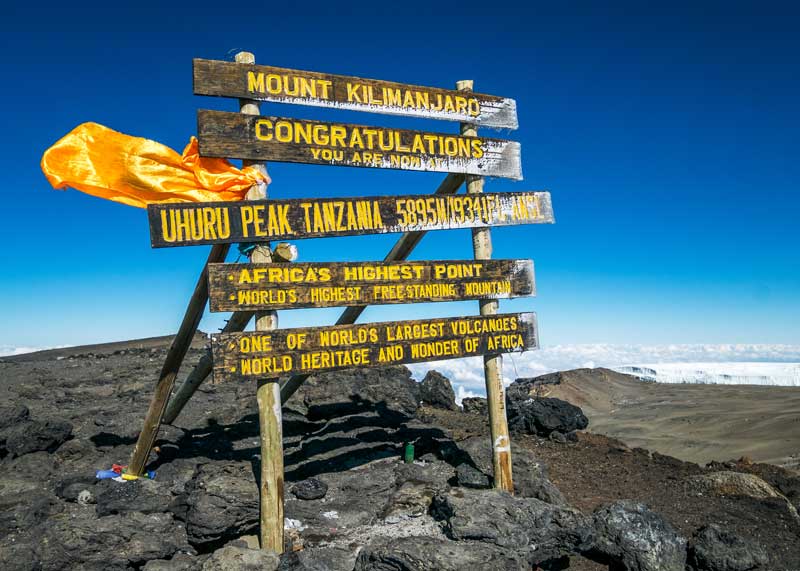
More reading: What’s the Largest Lake in Africa? 9 Largest Lakes Compared and the 12 Major Rivers in Africa.
Learn about the 14 Largest Deserts in the World
Your Turn
Which mountains have made it to your bucket list? Let me know below! Have something to add – or maybe a question? Ask it below and we’ll do our best to answer it.
Keep reading: 25 largest waterfalls in the world.

